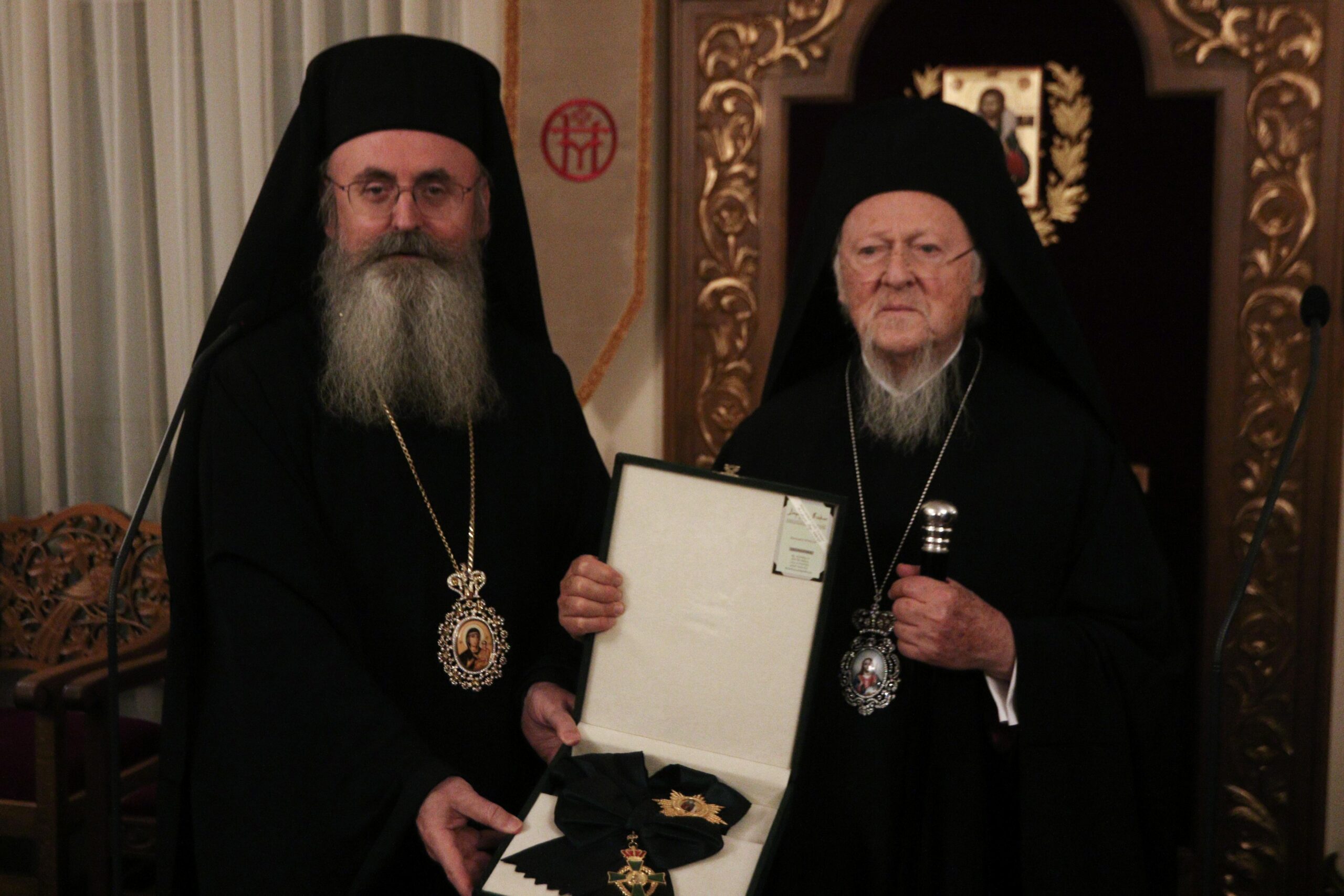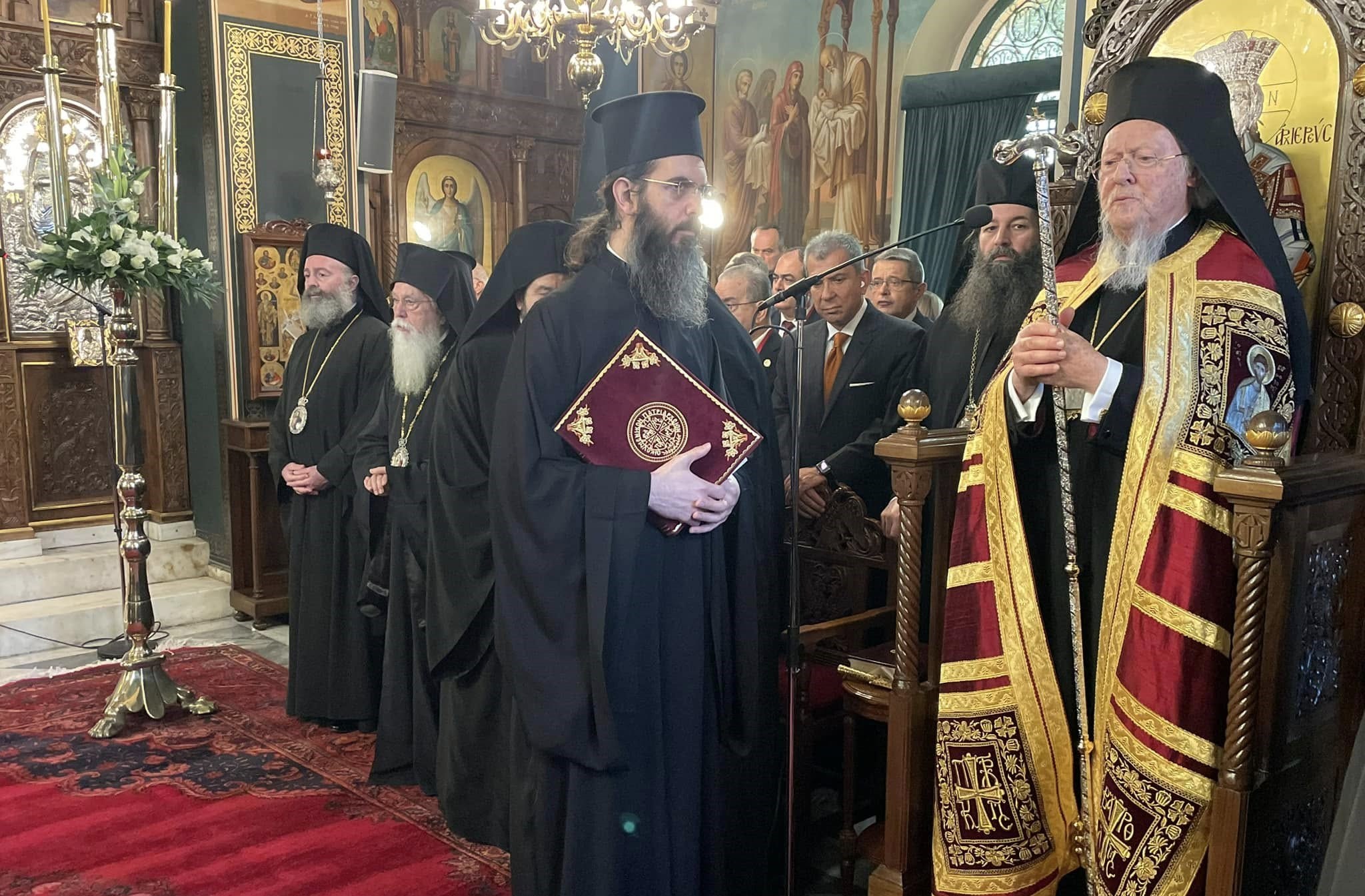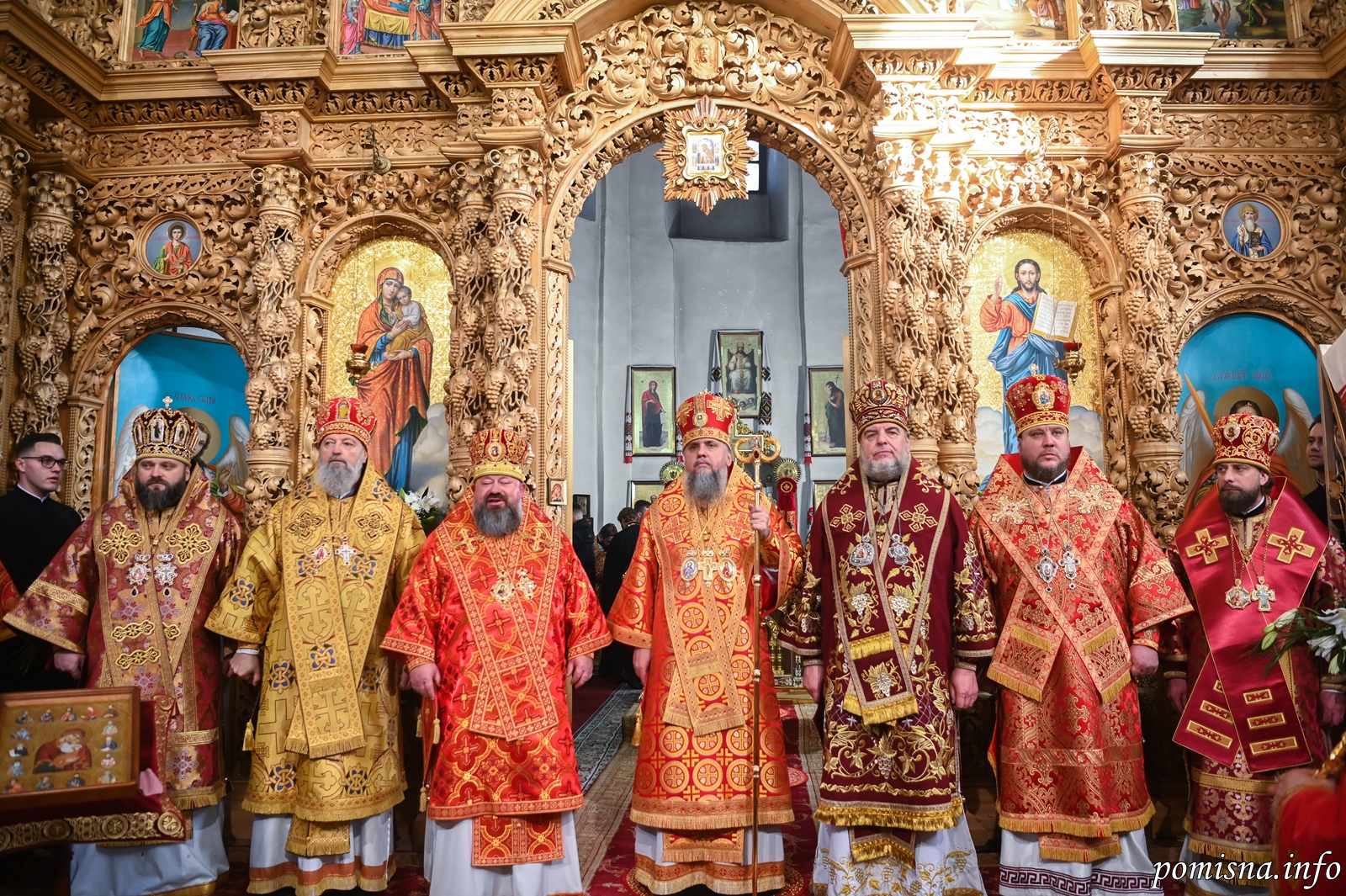The Prophetic Life of the Mother of God – the Pattern of Monastic Life


Monasticism is an imitation of the life of the Mother of God, which was from the beginning to the end an imitation of the way of Her Son and God. In essence, the handmaiden of God Mariam had prophetically followed the way of the Lord in Her life even before He came into the world, and She partook more than all in the judgment of the Son of God.
The life of the Holy Virgin was prophetical, because She was not only overshadowed by the Holy Spirit at the Annunciation, but also filled with the Holy Spirit. Rather, She was carried about and led by the Holy Comforter.
She uttered a word only once, singing Her hymn to the Lord, after She heard the good tidings of Archangel Gabriel and was illumined with the sacred Light of divine motherhood. The few verses of this hymn contain a prophecy, which the faithful will fulfil until the end of the world at every feast of the Mother of God: ‘Behold, from henceforth all generations shall call me blessed.’
Ever since, the Holy Virgin immersed Herself in silence. She no longer needed to utter any word, since She brought to earth the very Word of the Father. Yet the grace of Her presence was so palpable, that She imparted Her prophetic spirit to those who had the senses of their soul exercised in the spirit. Even before being born, Saint John the Baptist was the first man who magnified the Most Holy Mother of God when he leapt with joy in the womb of his mother, Elizabeth. And beyond any human logic, this righteous woman filled with the Holy Spirit was able to recognise in her young cousin, the fulfilment of the wondrous prophecy of Isaiah: ‘Behold, a virgin shall conceive, and bear a son, and shall call his name Immanuel.’[1]
The words of the Holy Virgin about the glory that She would receive from on high were truly prophetic, for they were pronounced in the Holy Spirit, since the young maiden was not charmed by any worldly glory. She had diminished Herself to the utmost before God and in Her answer to the greeting of the Archangel She only spoke of Her nothingness: ‘For He hath regarded the low estate of His handmaiden.’ However, the Most High poured forth so much grace into this nothing, into this majesty of the humility of the Mother of God, that it made the poor and insignificant maiden from Nazareth a god by grace, to whom generations and generations cry out with gratitude: ‘Rejoice thou who art god after God, holding the second place after the Holy Trinity, Thou who directly receivest the fulness of all God’s gifts and transmitest them to all, angels and man.’
For the rest of Her life, the Holy Virgin does not appear to accompany Christ when the multitudes glorify Him, when He performs mighty miracles, when He revealed His light on Tabor. She was by His side when, unable to bear His hard sayings and the holy otherness of His ethos, the multitudes would say, ‘he is beside himself,’ when they tried to stone Him to death, when He was hanging on the Cross.
The Holy Virgin was Christ’s Mother according to the flesh, and yet She was continually cutting Her will before Him, dedicating Her life to minister His holy, divine and saving will. She suffered all things with humble love, so as to allow all freedom to Christ to carry out the work which the Heavenly Father had entrusted to Him.
At times the words that Christ addressed to Her appeared to be harsh, denying the bond of the flesh that united them. However, in this way, the Lord was free to give the fearful commandment: ‘If any man come to me, and hate not his father, and mother, and wife, and children, and brethren, and sisters, yea, and his own life also, he cannot be my disciple.’[2] And while both Christ and His Mother renounced the mother-son relationship on the psychological level to the end, the Lord secretly honoured Her with even greater praise: ‘My mother and my brethren are these which hear the word of God, and do it.’[3]
Let us examine how some milestone events from the life of the Mother of God are connected with life in the spirit.
The Nativity of the Mother of God
The nativity of the Mother of God was a miracle in itself. Her parents were barren, but righteous and faithful. Their life of prayer and holiness made a barren womb yield a glorious fruit, the Mother of God.
As it was expressed in the parable of the fruitless fig tree, the will of the Lord reveals that God expects us to seek for His grace which is able to make fertile even our spiritual barrenness and bring forth our spiritual regeneration.
Entry into the Temple
The Holy Virgin was dedicated by Her parents to the temple from a tender age. The handmaiden Mariam had an uncommon love for the God of Her Fathers, and this Her love was expressed through prayer and reading of Scriptures. In the Holy of Holies She became not only the first monastic, but also the first Hesychast. She lived invoking the Name of God, reading His word, and assimilating His word in Her personal prayer.
Continuing in prayer, She found the wondrous place of Her deep heart, where She came to know the God of Her Fathers and was united with Him, through Whom She also experienced Her consubstantiality with the whole of mankind. In Her union with God, a divine state was naturally imparted to Her and the will of God became the unique law of Her existence. Yet one is the divine will that reigns in heaven, but also in the earth of the heart of those who have transferred their existence to heaven: ‘that all may be saved’. It is with this will that the Firstborn came into the world, and it is with this will that He lived, prayed, taught, suffered, died, was risen and ascended. It is this will that the Most Holy Mother of God ministered and does minister through Her intercessions.
Annunciation
The surrendering of the Holy Virgin to the divine will was perfect and indescribable, and so She became the vessel of Him Whom nothing can contain, the chariot of Him Who sits on the cherubim. There is no greater form of ascetic struggle than surrendering ourselves to the will and providence of God. This is why the Church continually exhorts her children, ‘Let us commend ourselves and one another, and our whole life to Christ our God.’
When He created the world, God brought all things from non-being into being with one word: ‘Let it be.’ Now, through the blessed ‘yes’ of Her obedience, Mariam said, ‘Be it unto me according to thy word’ and brought down to earth the Creator Himself, revealing the great miracle that occurs when the little human will is fully and voluntarily identified with the perfect divine will. The Annunciation was the culmination of the fervent love and prayer of the Holy Virgin, but also of the utter condescension of God.
In Her Person, She attained to that which the monk seeks after with a mighty thirst in the struggle of obedience: the union of the heart with the Spirit of God. She prophetically fulfilled the purpose of each Christian in general, as it is repeatedly expressed by the great apostle Paul: that of becoming a living temple not made by the hand of man, a dwelling-place of the Holy Spirit.
Dormition
‘The time is come that judgment must begin at the house of God.’[4] By transgressing the commandment of God in Paradise, Adam severed his life-giving relationship with his Creator, and death entered his life as the just wages of sin. Then humankind was subjected to the law pleasure-pain-death, and fell prey to a vicious circle. Struggling to untangle himself from the snares of death, man became selfish and sought even greater pleasure, which of course ended in an even more pitiable death. In this way, the coils around him became more and more suffocating, rendering him able of every crime in order to survive under the dominion of the fear of death.
Christ became the Father of a new generation. Being born without corruption, without seed and without sin of the Mother of God and above all of the Holy Spirit, and living Himself a sinless life, Christ was not subject to the law of death. Yet, He voluntarily and freely suffered death in the place of His creature, so that His unjust and innocent death might thenceforth become the condemnation of the death that man rightfully deserved because of the sin that preceded.
In the Person of the Holy Virgin the judgment of Her Son was repeated. Her own conception was without seed and not of the will of the flesh. It was the fruit of the prolonged and sorrowful prayer of two holy people, of Joachim and Anna. Throughout Her life, She Herself never sinned, not even in thought. Consequently, She should not have died. However, faithfully following the Lord ‘withersoever He goeth’, She died of Her own will and thus Her death was assimilated into the death of Her Son, becoming the condemnation of the death which afflicted mankind. In Her Person, even that which was previously the object of mourning, the end of earthly life, is blessed.
How do we, as Christians and more especially as monks, partake of the judgment of God, which leads through death to everlasting life, to the communion with God and the choir of His Saints?
First and foremost, by embracing the mystery of obedience. In our fallen state, our little and sinful will became our life. Each time we deny it for the commandment of God, we suffer a certain death. Yet, precisely because the act of renouncing our will is performed for the sake of the commandment of our Elder, who is ‘in the place of Christ’, it strikes the death that we carry in our heart with a heavy blow and condemns it. Through obedience, we gradually overcome death and accumulate in our heart an abundance of life.
The day of the Dormition of the Mother of God is Her glory and personal Passover. Just as She opened wide Her embrace and Her heart to receive the divine Infant and served Christ with perfect self-denial throughout Her earthly life, so also on this day, He too receives Her immaculate soul into His embrace and into the heavenly tabernacles, sitting Her on the right hand of His glory.
The Dormition of the Mother of God and Her glorious translation to heaven urge the faithful to ponder on and long for things on high, to seek with their whole heart union with the Bridegroom Christ. And if the enemy sows the thought of morbid humility, which says that the Most Pure Virgin was full of grace and mightily worthy of such ascent, whereas we are enslaved to the passions and lie in vanity and in the pit of perdition, the word of the Lord leaves no room for any justification: ‘I came not to call the righteous, but sinners to repentance.’
Christ came to the world to find the lost sheep and save men from the bonds and snares of the devil. He came to heal the sick, to strengthen the weak, to comfort them that weep, to raise them that are bowed down by the injustice of this life. Instead of discouraging us, the awareness of our unworthiness and sinfulness, together with the consciousness of our spiritual poverty, can become a great urge to seek a Saviour from Heaven.
We do not put our confidence in our own powers. It is He Who gives strength. He gives us wings to detach ourselves from the earth, ascend on high and delight in the grace of the Supper of the blessed Kingdom of Heaven.
The Song of the Beloved
‘Upon thy right hand did stand the queen.’
As a descendant of king and prophet David, the Holy Virgin is the daughter of the king. But She is also the daughter of the Father of the new generation, of the King of all, Christ. As Mother of the King of kings, of the Lord of heaven and earth, She is also the Queen of all, the Queen of glory.
She who, at the beginning of the glorification of Christ on the dreadful Golgotha, stood on the right hand of the Cross, now stands unceasingly on the right hand of His heavenly glory. And of course, She does not stand there in an idle or passive way, but with all the spiritual tension which She already possessed from this life.
For as long as She lived on earth, She lived in a human body and was limited by the laws of nature. After Her sacred Dormition, She ascended above natural laws. Now She is transfigured, being enveloped in divine glory. She became all spirit, just as Her Son is spirit. Now that She has power and strength as the true Mother of God, She will offer more intensely the intercession for the salvation of the whole world, which She had already begun when She lived as a young maid in the Holy of Holies.
Her clothing is of wrought gold. She shall be brought unto the king in raiment of needlework.’ The Holy Virgin is clothed in the glorious garment that every Christian receives at Holy Baptism, which is Christ.[5] She is clothed with the precious raiment of Christ-like humility, since Her whole life was an unprecedented self-emptying. She received perfect grace, and in order to preserve it, She suffered a perfect crucifixion.
‘The king’s daughter is all glorious within.’ Every aspect of the earthly life of the Mother of God fulfilled the commandment of Her Son, that every work of godliness should be done in secret. She was like unto an electric cable, though which an immense amount of electricity passes, but nothing is visible on the outside.
Her glory has nothing in common with the deceiving glories of this world. Her glory is the radiance of Her secret virtue, Her inner beauty. It is a radiance of humility, love and intercession for the salvation of the world. The Holy Virgin shone forth with the Light of Christ that She bore within. Her glory is within, as She lived continually within Her deep heart. It is there that She preserved the grace of God and lived Her union with God and all mankind.
‘The virgins her companions that follow her shall be brought unto the king.’
Who are they that lead these brides, the virgin souls? Certainly, the mind turns with infinite and everlasting gratitude towards our spiritual fathers and elders, who have taken upon themselves to minister with big tears the union of the souls of the faithful with the Bridegroom Christ.
As the word of God teaches and daily experience confirms, without the Lord we can do nothing. However ardently they desire it, the souls will not ascend by their own power to the glory of God. They do not experience the changes and ascents of the heart as a reward of their own ascetic struggle. Others show them the way, others bear their burden, sustain them on the way and raise them each time they stumble.
New angelic, virgin souls following the Holy Virgin will be brought to the King of Heaven. This word is not referring to the virginity of the body, since ‘the flesh profiteth nothing’,[6] and ‘flesh and blood cannot inherit the kingdom of God.’[7] The virgins who will be vouchsafed to be lifted up to the glory of God following the Most Pure Virgin, are those who throughout their earthly life have not committed spiritual adultery through forgetfulness of God.
On the contrary, they became the possession of God. They bore His Spirit within them and trembled in case they grieve Him with the slightest movement. The godly passion of the love of God possessed their whole being. Their mind was not dispersed into all creation, but firmly established in the Lord, not forsaking for one instant the memory of God, ready to grasp every movement of His will. His precepts were the lights of their life and the unique law of their existence. They called upon the Name of Christ, lived for Christ, breathed Christ. Their heart experienced unceasing ascents and cried with groanings which cannot be uttered, ‘Abba, Father’.
Such souls are the pattern of the true monk. Spiritual virginity is that which gives value to the virginity of the body and unites man’s heart to the Spirit of God. Likewise, a monk is not he who simply wears the monastic schema, but he who is ‘strengthened with might by his Spirit in the inner man’,[8] which is of great price before God.[9]
[1] Isa. 7:14.
[2] Luke 14:26.
[3] Luke 8:21; cf. Matt. 12:50; Mark 3:35.
[4] 1 Pet. 4:17.
[5] See Gal. 3:27
[6] John 6:63.
[7] 1 Cor. 15:50.
[8] Eph. 3:16.
[9] Cf. 1 Pet. 3:4.
Source: pemptousia.com




